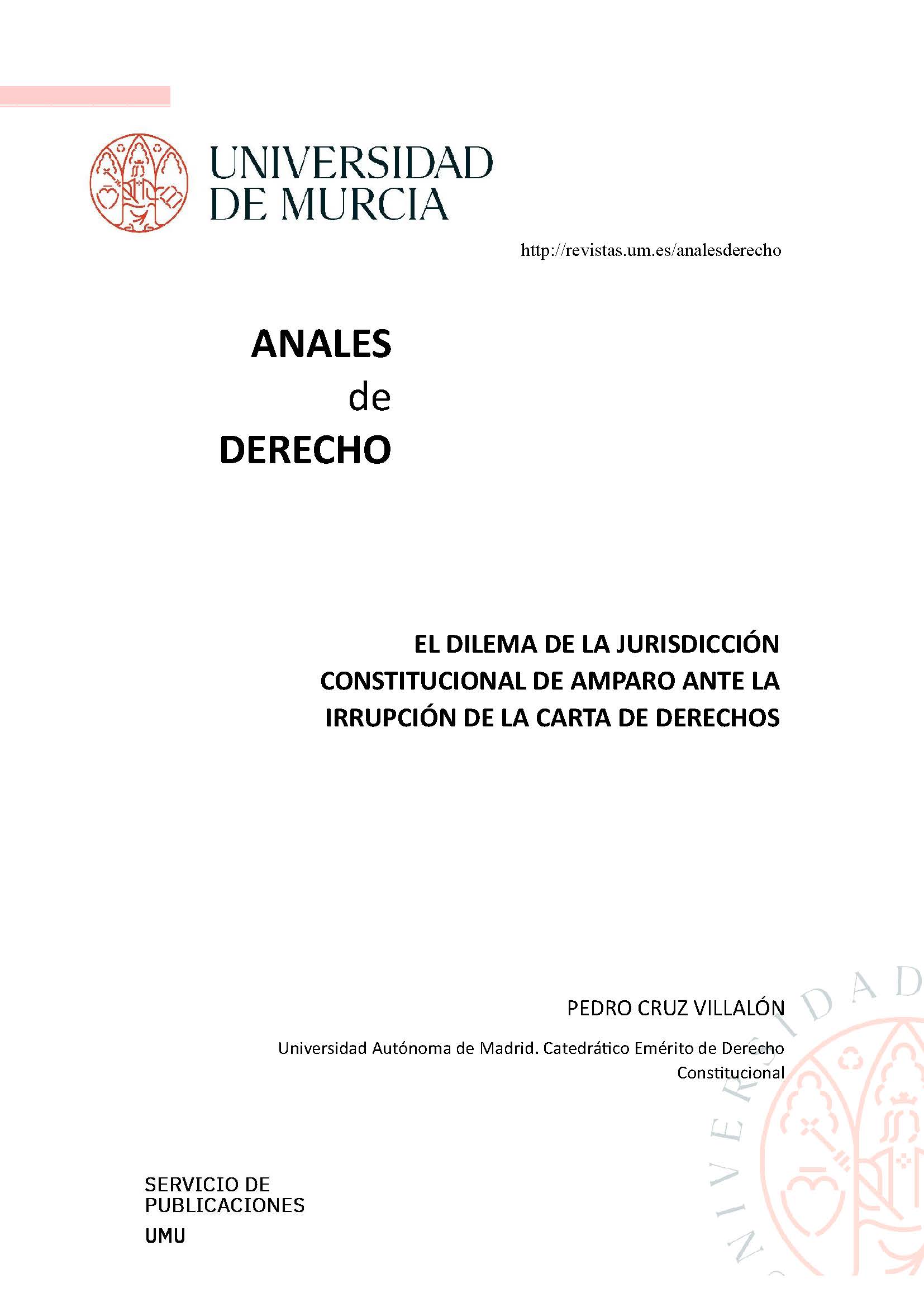El dilema de la jurisdicción constitucional de amparo ante la irrupción de la Carta de Derechos Fundamentales
Resumen
El Tribunal Constitucional español tiene ante sí el reto de cómo integrar satisfactoriamente la Carta de Derechos Fundamentales de la Unión Europea (CDF) en el marco de su jurisdicción de amparo. El camino hasta ahora seguido de hacerlo por la vía del mandato interpretativo del art. 10.2 CE ha agotado sus posibilidades. Entre las alternativas posibles, la extensión de la jurisdicción constitucional de amparo a los derechos correspondientes de la CDF parece la opción menos conflictiva.
Descargas
-
Resumen424
-
.pdf248
Citas
Alonso García, R., “El TC y el derecho al olvido ¿allanando un camino ‘a la alemana’ de la CDFUE como parámetro directo del amparo?, en, Revista Española de Derecho Europeo, 82 2022, pp. 9-15.
Arzoz, X., “Avoiding the rain or learning to dance in it: the hesitations of the Spanish Constitutional Court”, Preprint No.1/23 Preprint Series of the Center for European Studies Luis Ortega Álvarez and the Jean Monnet Chair of European Administrative Law in Global Perspective, 2023.
Arzoz Santisteban, X., “Transformaciones Judiciales. Karlsruhe y los derechos fundamentales de la Unión Europea”, Madrid, CEPC, 2022.
Beltrán, M./Sarmiento, D. (coord.), “Un Tribual para la Constitución”, Madrid, Colegio de Registradores, 2017.
Bogdandy, A.v./Huber, P.M./Grabenwarter, Chr., “Constitutional Adjudication. Common Themes and Challenges”, Oxford, OUP, 2023.
Bogdandy, A. v./Spieker, L, D., ”Reverse Solange 2.0 : Die Durchsetzung europäischer Werte und die unions- und strafrechtliche Verantwortung nationaler Richter“, Europarecht, 55 (2020), 3, pp. 301-332.
Clavero, B., “Los derechos y los jueces”, Madrid, Civitas, 1988.
Cruz Villalón, P., “Still on Constitutional Courts at the Rescue of their Mandate”, en, Donath, B.P./Heger, A./Malkmus, M./Bayrak, O. (eds.), “Der Schutz des Individuums durch das Recht. Festschrift für Rainer Hofmann zum 70. Geburtstag”, Springer, 2023, pp. 907-918.
Cruz Villalón, P., “Bemerkungen zu Begriff und Funktion der Verfassung des EU-Mitgliedstaates“, en, Festschrift für Franz Merli zum 70. Geburtstag, 2023, pp. 9-21 (en prensa)
Cruz Villalón, P., “De la persistencia de un viejo dictum: la STC 89/2022, en contexto”, en: Fromage, d. (ed.), “Jacques Ziller, a European Scholar”. Florencia, European University Institute, 2022, pp. 230-241.
Cruz Villalón, P., “¿Una forma de cooperación judicial no reclamada? Sobre la extensión del amparo a la Carta de Derechos Fundamentales de la UE”, en, Anuario Iberoamericano de Justicia Constitucional, 25, 2021, pp. 57-85.
Cruz Villalón, P., “Sobre la ‘especial responsabilidad’ del Tribunal de Justicia en la aplicación de la Carta de Derechos fundamentales2, en, Revista de Derecho Comunitario Europeo, (año 24(, nº 66 (2020), pp. 363-384.
Cruz Villalón, P./Requejo Pagés, J.L., “La relación entre la cuestión prejudicial y la cuestión de inconstitucionalidad2, en, Revista de Derecho Comunitario Europeo, 19, nº 50 (2015), pp. 173-194.
Cruz Villalón, P., “’All the guidance’, ERT und Wachauf”, en, Poiares Maduro, M./Azoulai, L. (eds.), The Past and Present of EU Law. The Classics of EU Law Revisited on the 50th Anniversary of the Rome Treaty, Hart, 2010, pp. 162-170.
Haltern, U., Europarecht. Dogmatik im Kontext, 2º ed., Tubinga, Mohr Siebeck, 2007, pp. 491-598.
Hofmann, R./Heger, A., „Zur neuen Grundrechte-architektur im europäischen Mehrebenensystem“. En, Europäische Grundrechte Zeitschrift, 48, 1-11.
Lübbe-Wolff, G., „Beratungskulturen. Wie Verfassungsgerichte arbeiten, und wovon es abhängt, ob sie integrieren oder polarisieren“. Berlín, Konrad-Adenauer-Stiftung, 2022.
Merli, F., “Die Konstitutionalisierung der EU-Grundrechte: Das österreichische Beispiel“, en, Donath, B.P./Heger, A./Malkmus, M./Bayrak, O. (eds.), “Der Schutz des Individuums durch das Recht. Festschrift für Rainer Hofmann zum 70. Geburtstag”, Springer, 2023, pp. 873-886.
Oliver Araujo, J., “El recurso de amparo”, Palma de Mallorca, Publicaciones Facultad de Derecho, 1987.
Paris, D., “The Impact of EU Law and the ECHR on National Constitutional Adjudication in the European Legal Space”, en, Bogdandy, A.v./Huber, P.M./Grabenwarter, Chr. (eds.), Constitutional Adjudication: Common Themes and Challenges, OUP, Oxford, 2023, pp. 477-494.
Pérez Nieto, Rafael, Art. 24.1. “Tutela Judicial Efectiva y Jurisdicción Administrativa”, en…593-631.
Prechal, S., “Redefining the Relationship between Rewe-effectiveness and Effective Judicial Protection, en, Review of European Administrative Law, 4 (2011), pp. 31-50.
Requejo Pagés, J.L., “The Decline of the Traditional Model of European Constitutional Adjudication”, en, Bogdandy, A.v./Huber, P.M./Grabenwarter, Chr. (eds.), Constitutional Adjudication: Common Themes and Challenges, OUP, Oxford, 2023, pp. 613-649.
Sáiz Arnáiz, A., “Art. 10.2. La interpretación de los derechos fundamentales y los tratados internacionales sobre derechos humanos”, en, Casas Baamonde, M. E./Rodríguez-Piñero Bravo-Ferrer, M. (eds.), “Comentarios a la Constitución Española. XXX Aniversario”. Wolters Kluwer, 2008, pp. 193-208.
Sarmiento, D., “El Derecho de la Unión Europea”. 4ª ed. Madrid, Marcial Pons, 2022.
Vašek, M., “Constitutional Jurisdiction and Protection of Fundamental Rights in Europe”, en, Bogdandy, A.v./Huber, P.M./Grabenwarter, Chr. (eds.), Constitutional Adjudication: Common Themes and Challenges, OUP, Oxford, 2023, pp. 325-381.
Visser, Maartje de, “Comparative Review in Europe. A Comparative Analysis”, Hart, 2014.

- 29-12-2023 (3)
- 29-12-2023 (2)
- 28-12-2023 (1)

Esta obra está bajo una licencia internacional Creative Commons Atribución-NoComercial-SinDerivadas 4.0.
Las obras que se publican en esta revista están sujetas a los siguientes términos:
1. El Servicio de Publicaciones de la Universidad de Murcia (la editorial) conserva los derechos patrimoniales (copyright) de las obras publicadas, y favorece y permite la reutilización de las mismas bajo la licencia de uso indicada en el punto 2.
2. Las obras se publican en la edición electrónica de la revista bajo una licencia Creative Commons Reconocimiento-NoComercial-SinObraDerivada 3.0 España (texto legal). Se pueden copiar, usar, difundir, transmitir y exponer públicamente, siempre que: i) se cite la autoría y la fuente original de su publicación (revista, editorial y URL de la obra); ii) no se usen para fines comerciales; iii) se mencione la existencia y especificaciones de esta licencia de uso.
3. Condiciones de auto-archivo. Se permite y se anima a los autores a difundir electrónicamente las versiones pre-print (versión antes de ser evaluada) y/o post-print (versión evaluada y aceptada para su publicación) de sus obras antes de su publicación, ya que favorece su circulación y difusión más temprana y con ello un posible aumento en su citación y alcance entre la comunidad académica. Color RoMEO: verde.




